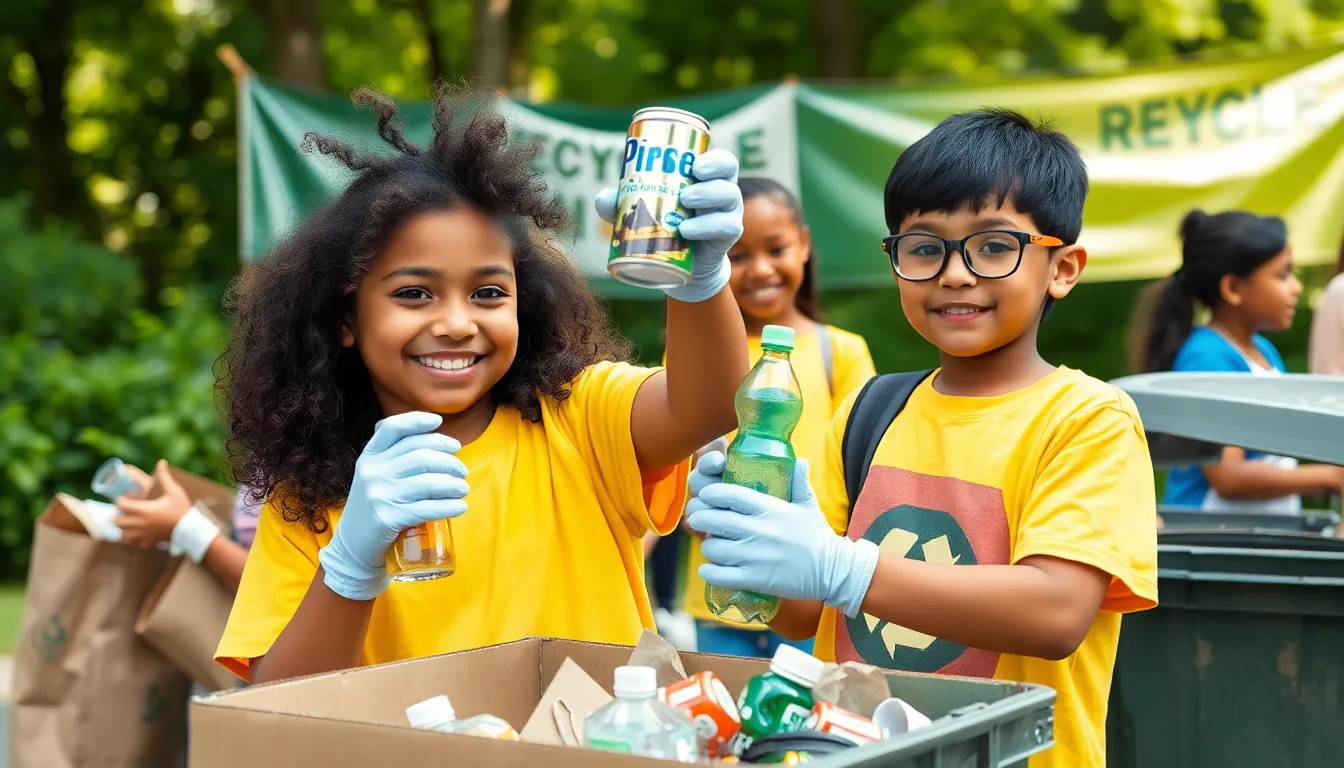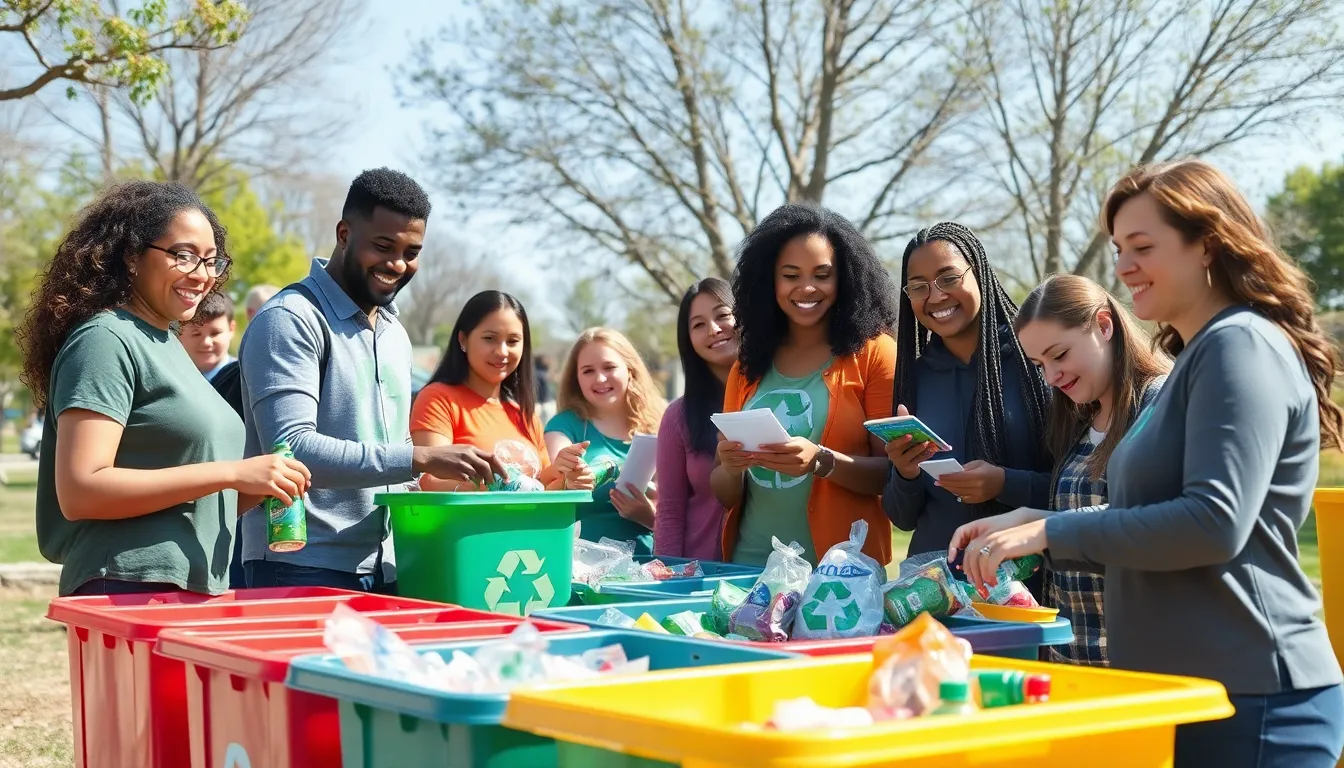Recycling education isn’t just a buzzword; it’s the superhero cape every eco-warrior needs. With landfills overflowing and Mother Nature giving us the side-eye, understanding how to recycle effectively can turn anyone into a planet-saving champion. Imagine turning that empty soda can into a shiny new bicycle instead of a sad lump of metal in a landfill. Sounds cool, right?
Table of Contents
ToggleImportance Of Recycling Education
Recycling education plays a pivotal role in fostering responsible environmental stewardship. By equipping individuals with knowledge, communities can effectively combat waste-related challenges.
Environmental Impact
Awareness of recycling practices significantly reduces waste accumulation. Landfills contribute to soil and water pollution as materials decompose. Understanding how to sort recyclables—like plastics, metals, and paper—ensures proper disposal, preventing harmful substances from entering the environment. Annually, recycling 1 ton of paper saves about 24,000 gallons of water and reduces greenhouse gas emissions. Commitment to recycling helps conserve natural resources, supporting a healthier ecosystem for future generations.
Economic Benefits
Engaging in recycling creates economic opportunities and enhances sustainability. The recycling industry supports over 1.1 million jobs in the United States, generating $236 billion in revenue annually. Local economies benefit as recycling reduces waste disposal costs and promotes material recovery. By educating citizens about recycling, communities can bolster their local economies while simultaneously reducing the demand for raw materials. Efficient recycling practices can also lead to lower production costs for manufacturers, promoting a circular economy.
Current Status Of Recycling Education
Recycling education varies significantly worldwide, reflecting diverse cultural attitudes and waste management practices. Awareness campaigns in many countries highlight the importance of proper recycling, showcasing its benefits for the environment and economy.
Global Perspectives
Different regions face unique challenges regarding recycling. In Europe, countries like Germany lead with a recycling rate of 68.6%, driven by stringent regulations and public awareness. Conversely, in the U.S., the recycling rate hovers around 35%, necessitating increased educational efforts. Asia experiences rapid growth in Internet access, leveraging technology to spread information about recycling effectively. Collaborations among nations foster knowledge sharing, promoting best practices and innovative solutions globally. Engaging citizens through social media platforms and community events enhances recycling comprehension and participation.
Local Initiatives
Many cities in the U.S. implement effective local recycling initiatives. Programs in San Francisco aim for zero waste by 2030, offering extensive educational resources to residents. Moreover, schools in Seattle incorporate recycling education into their curricula, empowering students to advocate for sustainable practices. Local government efforts fund workshops that educate communities on reducing waste. Programs targeting specific items, like electronics or plastics, also support recycling education, addressing common disposal misconceptions. By incorporating hands-on activities, communities nurture responsible behaviors in future generations, reinforcing the commitment to recycling and environmental stewardship.
Effective Strategies For Teaching Recycling
Teaching recycling involves various effective strategies that promote understanding and responsible waste management. Integrating recycling into existing curricula can enhance engagement and knowledge retention.
Curriculum Integration
Integrating recycling into the curriculum increases awareness early in education. Subjects like science can incorporate lessons on material properties and recycling processes, highlighting the importance of sustainability. Math lessons can involve calculating the environmental impact of recycling efforts, providing practical applications for students. English classes might focus on persuasive writing campaigns that encourage peers to recycle responsibly. Schools can implement dedicated recycling units aimed at sharing local initiatives, fostering community engagement. This structured approach not only educates students but also empowers them to take action within their communities.
Hands-On Activities
Engaging students with hands-on activities enhances their understanding of recycling concepts. Organizing community clean-up events encourages active participation in waste reduction. Crafting projects from recyclable materials sparks creativity while illustrating the potential of reused items. School-wide recycling competitions promote teamwork and instill a sense of responsibility for the environment. Additionally, field trips to recycling centers provide a real-world perspective on the recycling process, showcasing its significance. These interactive experiences cultivate a deeper appreciation for recycling and its impact on the planet.
Challenges In Recycling Education
Recycling education faces several challenges that hinder its effectiveness. Misinformation remains a significant barrier to proper recycling practices. Many individuals lack a clear understanding of what materials can be recycled, often resulting in contamination of recycling streams. This confusion can arise from mixed messages in media and community guidelines. Educators play a crucial role in dispelling myths, yet the spread of incorrect information continues to persist.
Accessibility issues also impede recycling education efforts. Communities often experience disparities in access to education resources and recycling programs. Urban areas typically offer more comprehensive recycling initiatives than rural regions. Inadequate funding and limited infrastructure contribute to these challenges. Furthermore, language barriers may alienate non-English speaking populations, hindering effective communication of recycling guidelines. Addressing these disparities becomes vital to fostering equitable recycling education and ensuring all individuals can participate in environmental stewardship.
Conclusion
Recycling education plays a vital role in shaping a sustainable future. By empowering individuals with the knowledge of effective recycling practices, communities can significantly reduce waste and protect natural resources. The benefits extend beyond environmental preservation to economic growth and job creation, making recycling a critical component of modern society.
Addressing the challenges in recycling education ensures that everyone has access to accurate information and resources. As awareness spreads and engagement increases, the potential for positive change becomes limitless. Together, through informed actions and community initiatives, individuals can contribute to a healthier planet for generations to come.





